Overview
In today’s rapidly evolving healthcare landscape, the integration of automation is not just beneficial; it is essential. We recognize that the key benefits of automation in healthcare encompass:
- Enhanced operational efficiency
- Improved patient care
- Reduced administrative burdens
By facilitating seamless data integration and streamlining processes, automation empowers us to focus more on patient engagement and care quality. This shift not only alleviates the strain on healthcare providers but also significantly enhances the overall healthcare system.
What’s holding your team back from embracing this transformative technology? Together, we can navigate these complexities and unlock the full potential of automation in healthcare.
Introduction
In the rapidly evolving landscape of healthcare, we recognize that organizations must embrace innovative solutions to enhance operational efficiency and improve patient care. By integrating automation, artificial intelligence, and hybrid platforms, we see companies like Avato, KMS Healthcare, and Infosys BPM leading this transformation. These technologies not only streamline administrative processes but also foster better communication and engagement between healthcare providers and patients.
As we anticipate significant growth in automation and AI applications, understanding how these advancements can reshape healthcare operations becomes crucial for organizations striving to meet modern demands while ensuring high-quality care.
What challenges are holding your team back from leveraging these transformative technologies? Together, we can navigate these complexities and unlock the potential of advanced solutions for a brighter healthcare future.
Avato: Streamline Healthcare Operations with Hybrid Integration
At Avato, we recognize the pressing need for seamless integration in the medical field. Our hybrid connection platform is specifically designed to link isolated legacy systems and fragmented data within medical organizations. By facilitating seamless data flow and offering real-time monitoring, we empower medical providers to streamline operations, alleviate administrative burdens, and ultimately enhance patient care, showcasing the benefits of automation in healthcare. This combined strategy not only tackles the risks related to digital transformation but also accelerates the implementation of innovative solutions.
As a result, the benefits of automation in healthcare enable medical facilities to rapidly adjust to changing needs, significantly enhancing overall operational efficiency. The medical system connection market is poised for growth as organizations increasingly seek to link on-premises and cloud applications. This trend underscores the essential role of hybrid connectivity in contemporary medical operations. Our platform is strategically positioned to capitalize on this growth, providing the necessary tools for medical providers to navigate the complexities of integration.
Designed for collaborative projects where 24/7 availability is crucial, we ensure a robust foundation for digital transformation efforts, enabling service providers to balance speed with the complexity required to future-proof their technology stack.
Importantly, our platform accommodates 12 levels of interface maturity, allowing organizations to customize their connection strategies effectively. Furthermore, the regional growth in the medical data integration market, particularly in North America, highlights the varying dynamics and opportunities that we can leverage. By ensuring that medical providers can effectively meet these demands, our platform stands at the forefront of this transformation, highlighting the benefits of automation in healthcare by driving enhancements in operational efficiency and care quality.
The name ‘Avato,’ derived from the Hungarian word for ‘dedication,’ reflects our commitment to architecting the technology foundation required for rich, connected customer experiences.
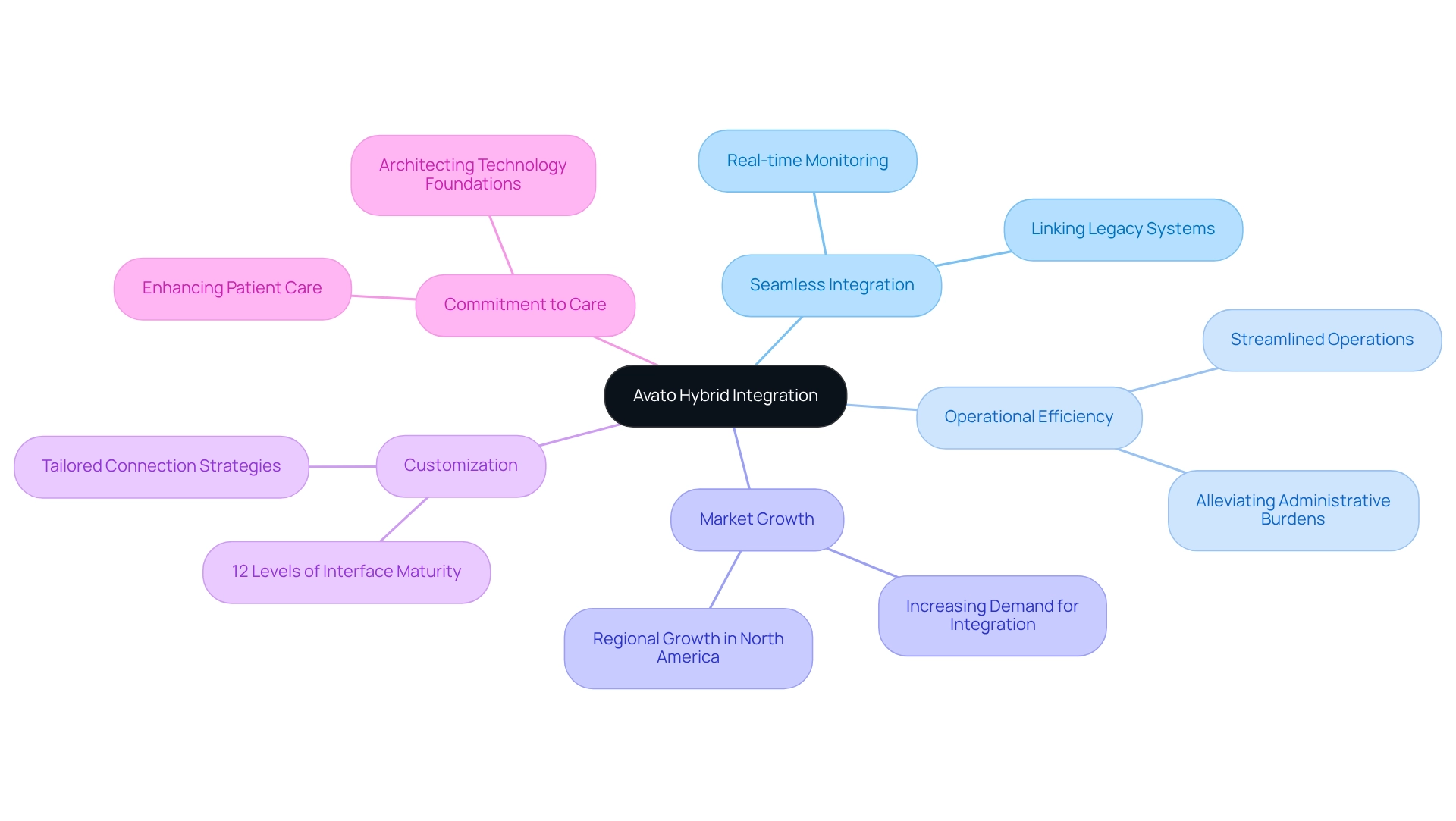
IBM: Enhance Healthcare Efficiency with AI Solutions
At Avato, we harness the power of artificial intelligence to revolutionize medical operations by automating routine tasks, enhancing diagnostic precision, and highlighting the benefits of automation in healthcare to boost client engagement. Our Secure Hybrid Integration Platform enables organizations to unlock data and systems in weeks, not months, ensuring 24/7 uptime and reliability for complex systems in banking, medical services, and government. This effective unification allows medical professionals to focus more on patient care, ultimately leading to improved health outcomes.
As the generative AI medical market is projected to exceed $10 billion, with expectations to reach $21.74 billion by 2032, the integration of AI technologies is becoming increasingly essential. While only 13% of individuals believe that AI will enhance the patient-provider relationship, this statistic highlights a critical area for improvement that can be addressed through operational efficiencies. By focusing on the benefits of automation in healthcare, we can free up medical professionals to foster stronger relationships with patients, thereby indirectly enhancing the patient experience.
For instance, AI can facilitate real-time data access across core medical systems, ensuring that all platforms remain interconnected and up to date without the need for redundant data entry. As one specialist pointed out, “AI workers can be granted access to essential medical systems, connecting key platforms without requiring data re-entry so everything is interconnected and current.” This seamless integration is crucial for realizing the benefits of automation in healthcare and improving operational workflows.
Furthermore, recent advancements, including the European Commission’s endorsement of new regulations for AI-powered medical devices in March 2024, underscore the increasing significance of AI governance in the medical field. These regulations aim not only to ensure compliance but also to enhance operational efficiency by establishing standards that highlight the benefits of automation in healthcare through the ethical use of AI technologies. Implementing AI guardrails, as discussed in the case study titled “AI Guardrails for Healthcare AI Governance,” can help address concerns regarding biases and data security, ensuring that AI solutions are used responsibly. By leveraging Avato’s capabilities alongside AI solutions, we can boost efficiency, enhance diagnostic precision, and ultimately achieve improved outcomes for individuals.
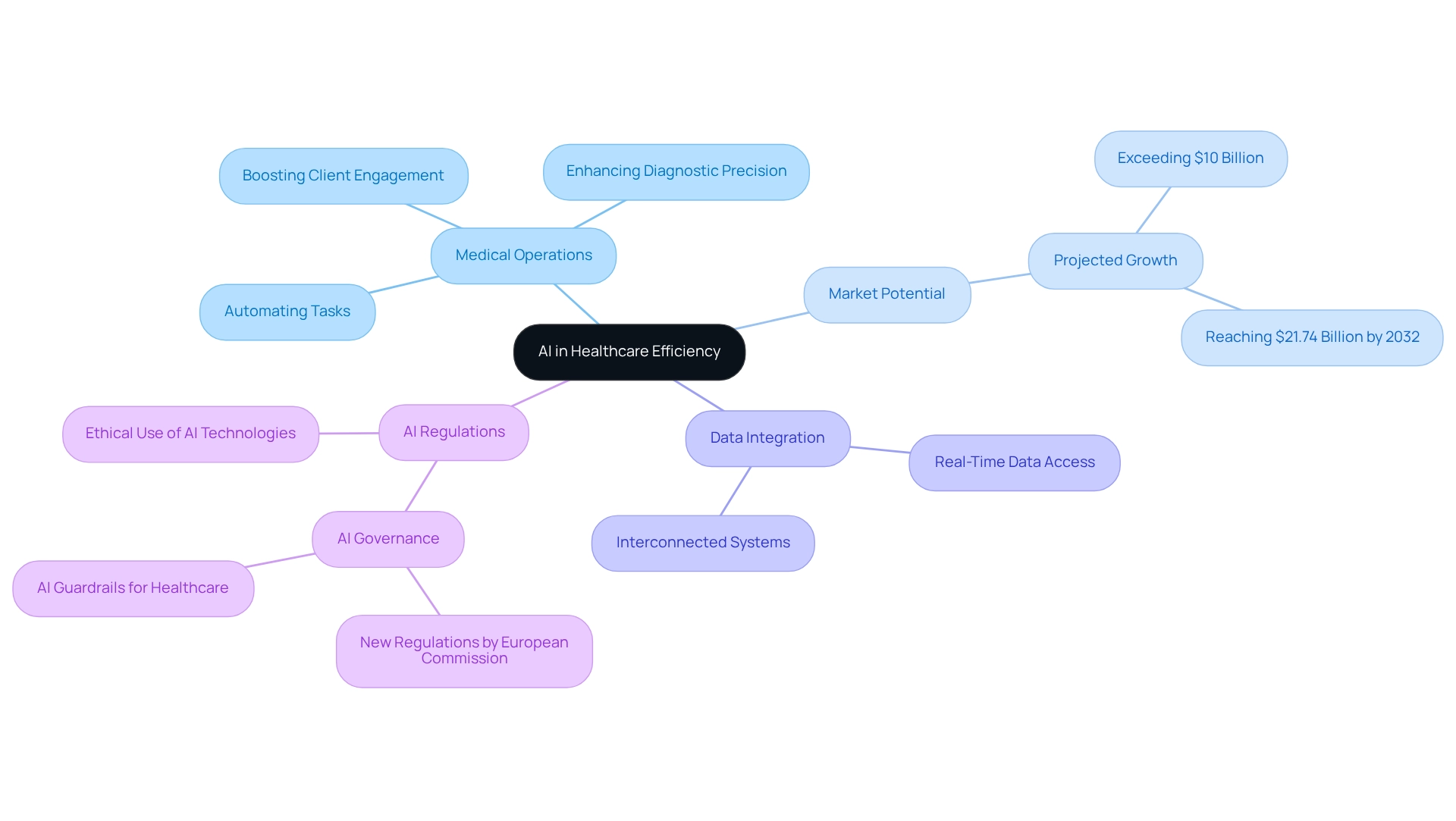
KMS Healthcare: Reduce Costs and Improve Patient Experience with Automation
We lead the charge in automating healthcare processes, highlighting the benefits of automation in healthcare by significantly lowering operational costs while enhancing the experiences of those receiving care. By utilizing automated client engagement tools, we effectively minimize manual workloads and reduce errors, highlighting the benefits of automation in healthcare through faster service delivery. This approach not only leads to substantial cost reductions but also enhances satisfaction by utilizing the benefits of automation in healthcare through timely communication and streamlined care pathways.
The integration of digital medicine, particularly through AI and VR, is revolutionizing care for individuals by providing innovative solutions that make the medical field more accessible. For instance, AI-driven robotic surgeries have the potential to decrease hospital stays by over 20%, translating to annual savings of $40 billion across the industry.
Furthermore, our commitment to client-focused care is evident in our innovative solutions that prioritize client involvement, ultimately fostering a more efficient and responsive medical delivery system. A notable case study is OSF HealthCare’s implementation of a virtual assistant named Clare, which has saved $1.2 million in contact center expenses while enhancing overall client satisfaction.
As mechanization advances, the benefits of automation in healthcare will be pivotal in reducing expenses and improving individual experiences, shaping the future of medical services.
What’s holding your team back? We encourage banking IT managers to explore how similar automation strategies, leveraging AI and VR, could be applied within their sectors to drive efficiency and cost reduction.
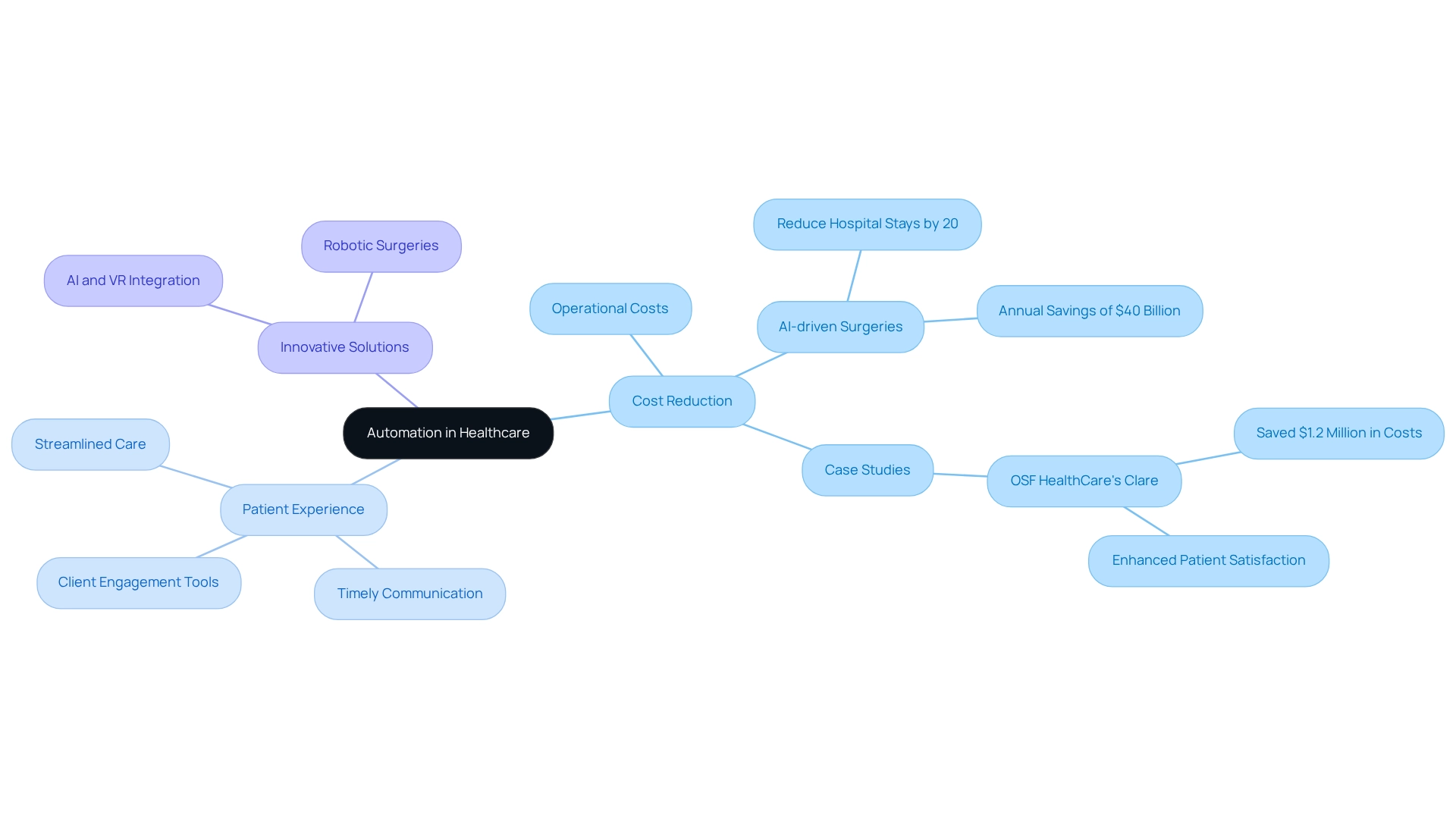
Infosys BPM: Simplify Administration and Enhance Communication in Healthcare
At Infosys BPM, we recognize the critical need for robust solutions that streamline essential administrative tasks in the medical field, which emphasizes the benefits of automation in healthcare, such as admissions, billing, and compliance management. By optimizing these functions, we help medical providers realize the benefits of automation in healthcare, significantly reducing the time spent on documentation. This reduction leads to improved communication among staff and individuals. Such enhancements not only boost operational efficiency but also allow medical professionals to dedicate more time to patient care, ultimately elevating the overall quality of service provided and demonstrating the benefits of automation in healthcare.
In 2025, the medical sector is witnessing a profound shift towards mechanization, with projections indicating that small and medium enterprises (SMEs) will adopt robotic process solutions at an impressive growth rate of 25% annually. This trend underscores the increasing acknowledgment of technology’s role in enhancing communication efficiency within medical environments, particularly as digital medicine continues to evolve. Expert opinions suggest that effective technology can yield substantial improvements in patient outcomes. One specialist noted that reducing hospital admissions by over 50% requires not only enhanced care but also optimized resource distribution, contributing to more sustainable medical systems. The integration of AI and VR technologies into these automated processes further personalizes care, facilitating improved management of individual data.
Our approach at Infosys BPM simplifies administration by incorporating advanced technologies that promote seamless communication and operational workflows. The future of robotic process automation (RPA) lies in advancements in cognitive technologies and low-code platforms, further enhancing the capabilities of systems within medical services. This progress facilitates effective access to and utilization of individual data.
Case studies demonstrate the efficacy of our solutions, revealing how automating client admissions and billing processes can yield significant advantages, including reduced administrative burdens and heightened client satisfaction. For instance, trends in other sectors, such as construction, indicate that automation is driving efficiency and safety improvements, with 59% of executives reporting enhanced results. As medical organizations increasingly embrace automation in 2025, they will recognize the benefits of automation in healthcare, particularly through streamlined administrative processes. This evolution paves the way for a more effective and patient-centric medical system that harnesses the power of digital medicine.
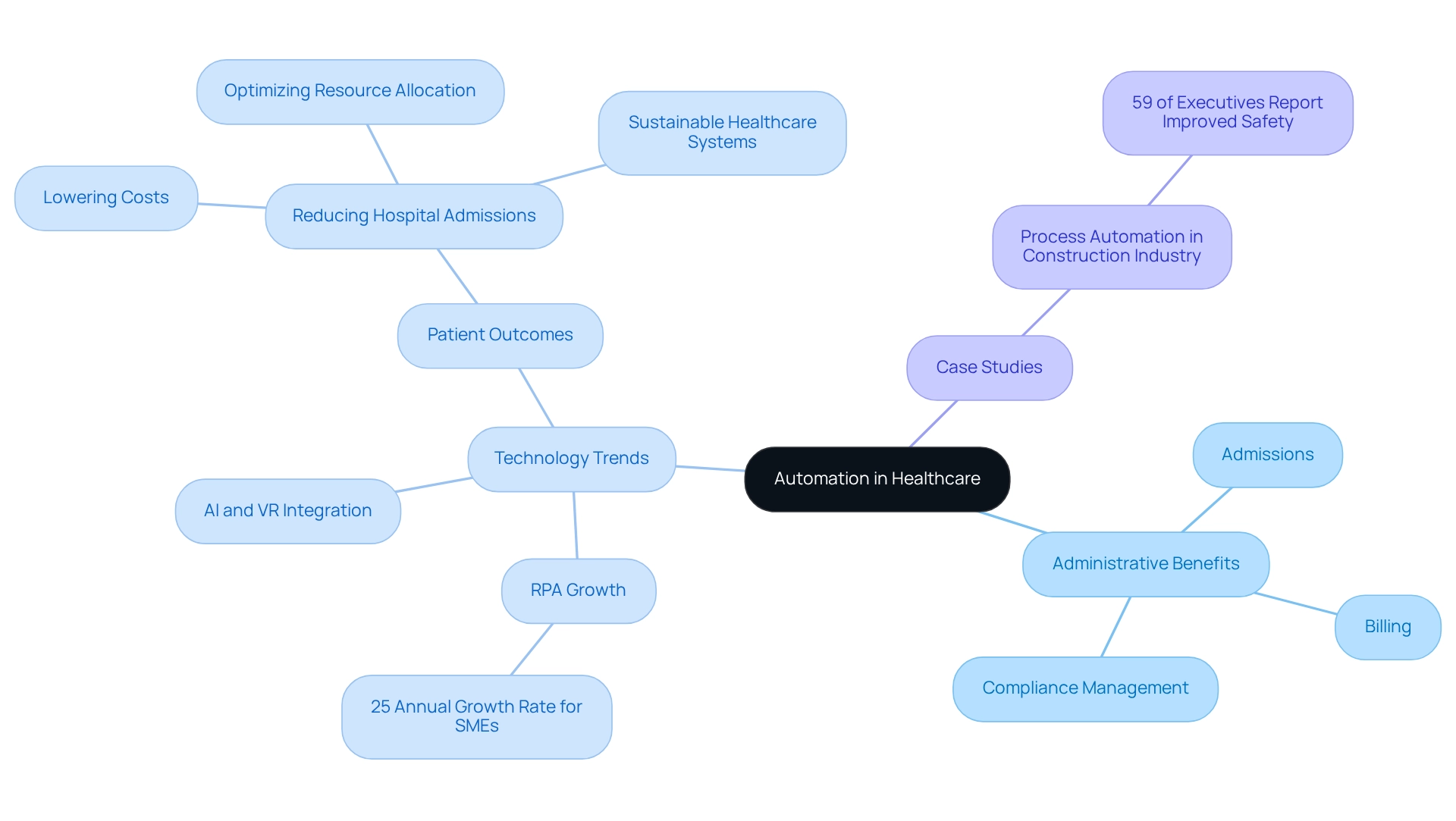
Invozone: Improve Data Management and Patient Engagement with Automation
At Avato, we excel in automating data management processes, significantly enhancing the involvement of individuals within medical settings. By implementing automated systems for managing client records, scheduling appointments, and facilitating follow-up communications, we demonstrate the benefits of automation in healthcare by empowering providers with accurate and timely information. This streamlined access not only enhances operational efficiency but also demonstrates the benefits of automation in healthcare by fostering stronger connections between individuals and providers, ultimately resulting in better health outcomes and increased satisfaction among individuals.
By 2025, we anticipate that the incorporation of mechanization in medical services will improve workflow efficiency, showcasing the benefits of automation in healthcare, which will allow providers to concentrate more on client care rather than administrative duties. For instance, the Hutt Valley case study illustrates how an adaptable digital workforce achieved 100% precision in e-referrals, conserving $527,000 and greatly enhancing referral efficiency—results that our platform can likewise support through its secure design tailored for complex systems.
Moreover, recent statistics reveal that while 39% of individuals express concerns regarding AI’s potential adverse impacts on the patient-physician relationship, the benefits of automation in healthcare are becoming increasingly clear. AI applications within the NHS are already being utilized for diagnostic purposes, showcasing the technology’s ability to deliver results with remarkable accuracy—such as ruling out heart attacks twice as fast as human counterparts, with a 99.6% accuracy rate. Our solutions are designed to address these concerns by ensuring that the benefits of automation in healthcare enhance rather than detract from the user experience, supported by continuous monitoring and robust analytics capabilities that optimize operations and improve customer experiences.
Our commitment to the benefits of automation in healthcare is evident in our innovative solutions that not only streamline processes but also improve the overall experience. By utilizing automated systems, medical providers can harness the benefits of automation in healthcare to ensure that patients receive timely updates and personalized communication, fostering a more engaged and satisfied patient base.
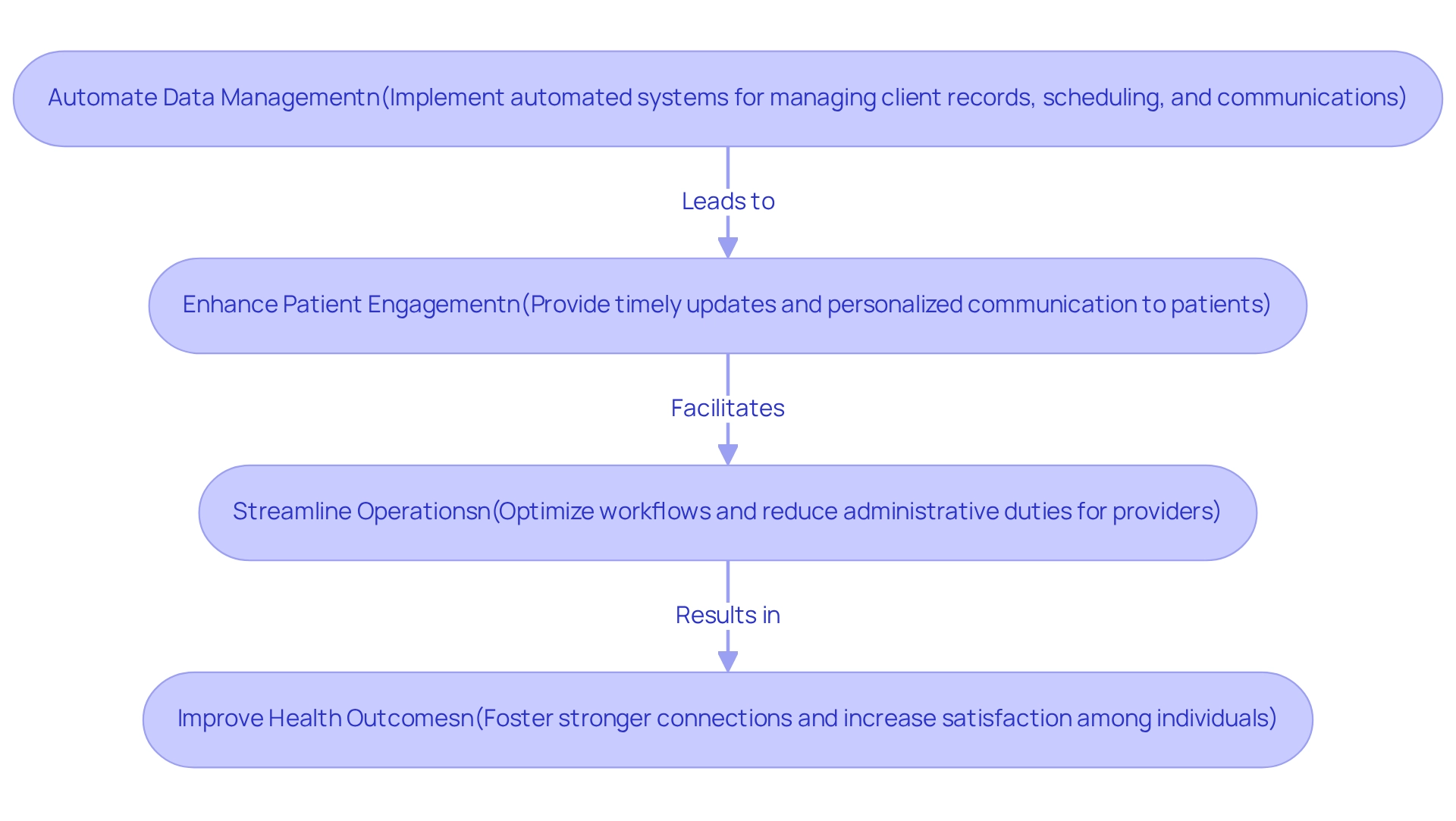
Kodjin: Streamline Workflows and Enhance Compliance with RPA
At Kodjin, we harness Robotic Process Automation (RPA) to significantly streamline workflows and bolster compliance, highlighting the benefits of automation in healthcare within medical organizations. By automating repetitive tasks—such as data entry, claims processing, and regulatory reporting—we can realize the benefits of automation in healthcare, empowering medical providers to minimize errors and maintain rigorous adherence to compliance standards. This mechanization not only enhances operational efficiency but also showcases the benefits of automation in healthcare by mitigating the risks associated with manual processes, allowing medical professionals to concentrate on delivering high-quality patient care.
As we look toward 2025, the benefits of automation in healthcare are becoming increasingly evident in medical services. Over 90% of C-level executives are now utilizing intelligent technology, reporting improved change management capabilities. This statistic underscores the growing recognition of RPA’s impact, particularly in medical organizations where effective change management is crucial. Moreover, RPA’s adaptability is highlighted by its applications across diverse sectors, including finance and customer service, showcasing its broad relevance.
Our commitment to enhancing compliance through technology is particularly noteworthy, as we address the pressing need for medical organizations to navigate complex regulatory landscapes efficiently. As Yana Pokora, Content Manager at Flobotics, states, “We firmly believe that automation shapes the future of global business and workforce efficiency.” This perspective is especially significant as the integration of AI and machine learning with RPA continues to evolve, showcasing the benefits of automation in healthcare by further improving workflow efficiency and compliance in medical settings. The potential for RPA to become an integral component of modern medical operations is set to expand, showcasing the benefits of automation in healthcare by driving advancements in digital medicine—such as AI and VR—that personalize care and enhance data accessibility.
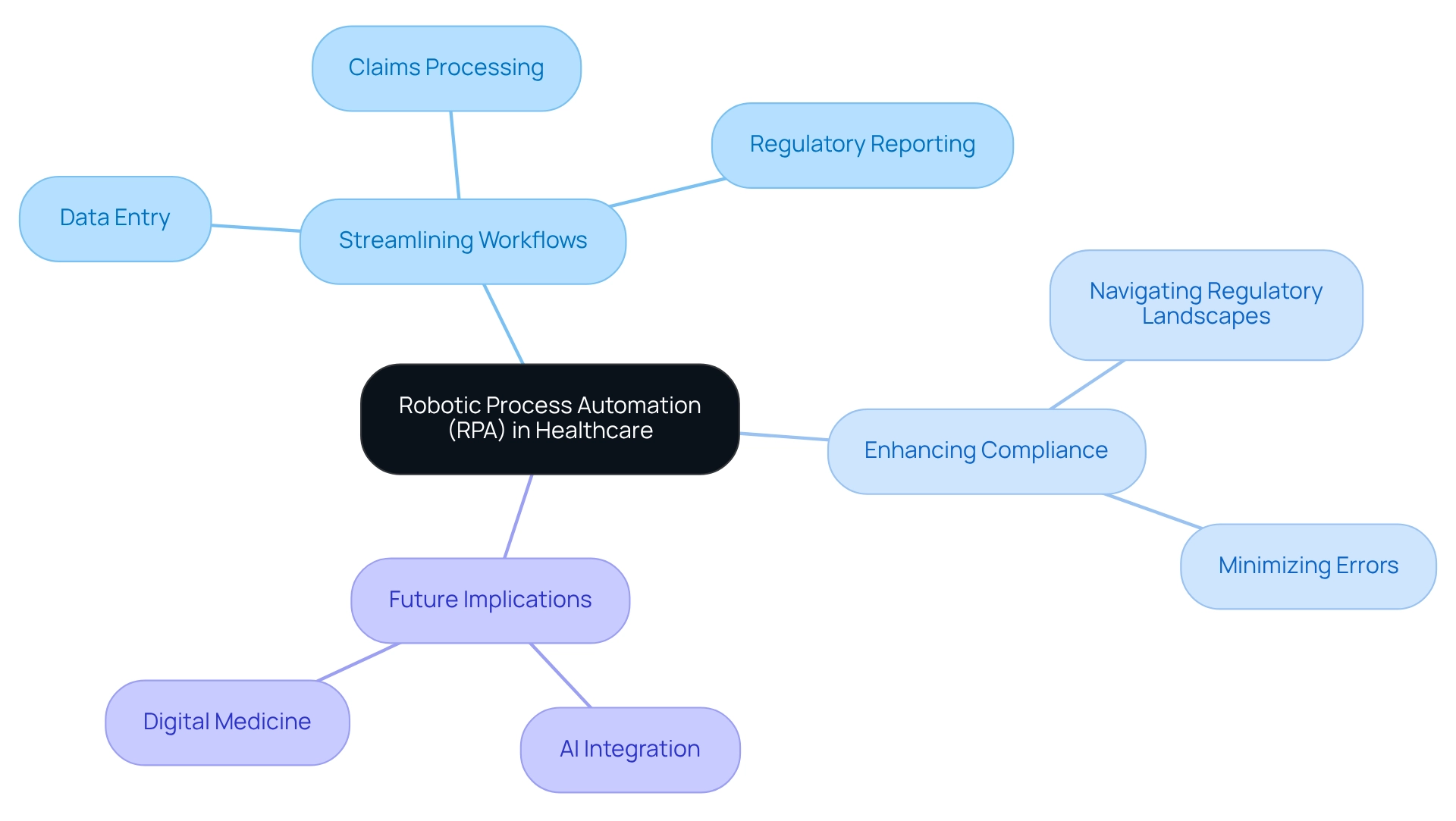
NetSuite: Manage Billing and Patient Data Efficiently with Automation
We recognize that the healthcare sector faces significant challenges in billing processes and data management. Our hybrid integration platform provides automation solutions that highlight the benefits of automation in healthcare, dramatically enhancing efficiency in these areas. By automating essential tasks such as invoicing, payment processing, and data entry, we highlight the benefits of automation in healthcare, helping medical organizations alleviate administrative burdens and minimize the likelihood of errors. This streamlined approach not only boosts financial efficiency but also showcases the benefits of automation in healthcare by ensuring timely billing and maintaining accurate records for individuals. Consequently, healthcare providers can achieve better financial management and increased patient satisfaction.
In fact, recent statistics reveal that 90% of IT staff attribute improved cross-team collaboration to automation, underscoring its transformative impact on operational workflows. Furthermore, client endorsements from industry leaders, such as Gustavo Estrada from BC Provincial Health Services Authority, highlight our effectiveness in simplifying complex projects and delivering results within desired timelines and budget constraints. Our commitment to designing technological solutions empowers medical organizations to secure their operations for the future through seamless data and system unification, emphasizing the benefits of automation in healthcare, as integrating our automation tools is essential for organizations aiming to enhance their billing processes and manage patient data efficiently.
What’s holding your team back from transforming your operations? Let us partner with you to navigate these complexities and drive meaningful change.
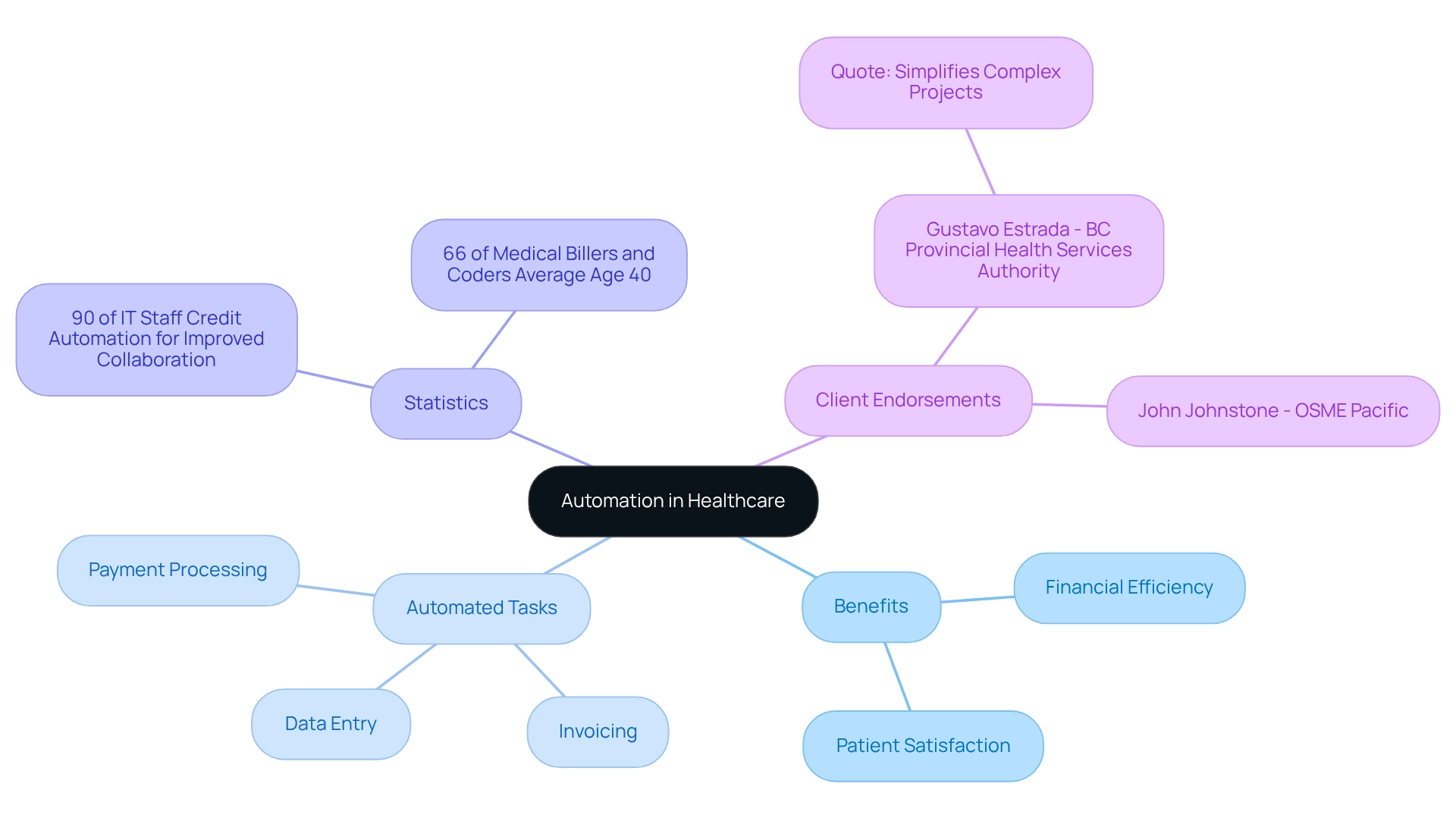
Conclusion
We recognize that the integration of automation, artificial intelligence, and hybrid platforms in healthcare is not merely a trend; it represents a fundamental shift that enhances operational efficiency and improves patient care. Companies like Avato, KMS Healthcare, and Infosys BPM lead this transformation, offering innovative solutions that streamline processes, reduce costs, and foster better communication between healthcare providers and patients.
Through hybrid integration platforms, we enable healthcare organizations to overcome the challenges posed by legacy systems and fragmented data, facilitating real-time monitoring and seamless data flow. Avato exemplifies this by providing tools that ensure 24/7 uptime, allowing providers to adapt swiftly to changing demands. Similarly, KMS Healthcare’s automation of patient engagement processes minimizes manual workloads, significantly enhancing patient satisfaction and care delivery.
As we continue to embrace these advanced technologies, the benefits of automation and AI become increasingly evident. From improving diagnostic accuracy to enhancing patient engagement, these solutions are reshaping the landscape of healthcare. The projected growth in the generative AI market and the adoption of robotic process automation highlight the critical role these technologies will play in the future.
In conclusion, our commitment to leveraging automation and AI in healthcare not only streamlines operations but also elevates the quality of patient care. As organizations navigate the complexities of digital transformation, embracing these innovative solutions will be key to unlocking their full potential and ensuring a brighter future for healthcare delivery. The time to act is now—modernizing healthcare operations is essential for meeting the demands of today’s patients while enhancing overall outcomes.

